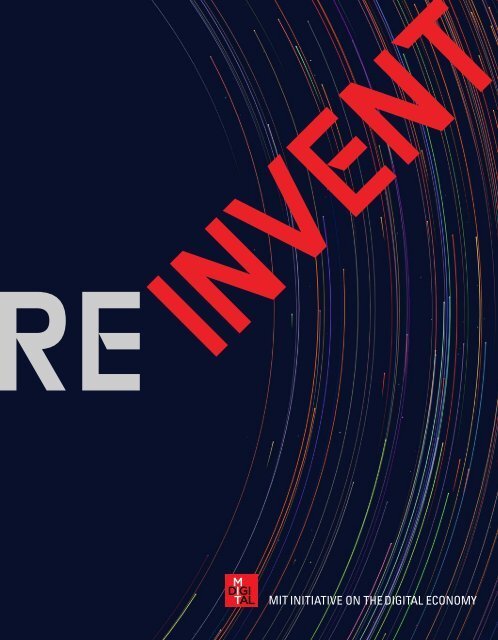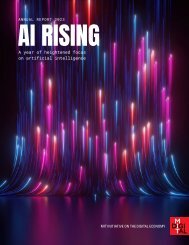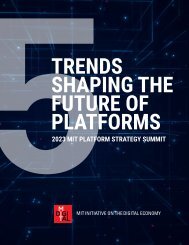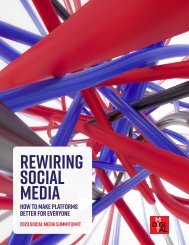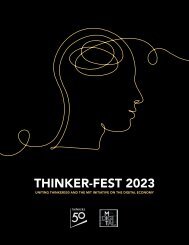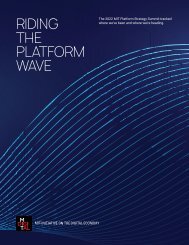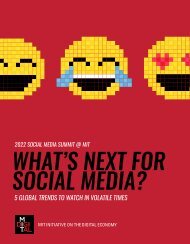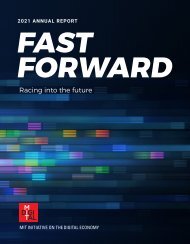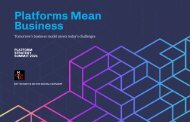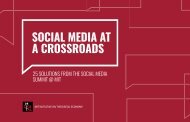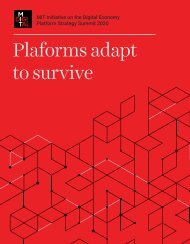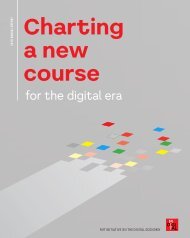MIT IDE 2020 Annual Report
Create successful ePaper yourself
Turn your PDF publications into a flip-book with our unique Google optimized e-Paper software.
staying<br />
ahead of<br />
the curve<br />
requires<br />
reinvention.<br />
Change is the only constant, and the world faced<br />
and endured many painful challenges in <strong>2020</strong>.<br />
The changes we introduced this year make us<br />
more prepared than ever to support our mission.<br />
The <strong>MIT</strong> Initiative on the Digital Economy (<strong>IDE</strong>) constantly looks<br />
toward the future—anticipating, exploring, and fine-tuning our<br />
focus to the critical challenges and questions of tomorrow.<br />
In early <strong>2020</strong>, we began to refresh our approach and accelerate in<br />
new directions. After co-founding the <strong>IDE</strong> in 2014, Professor Erik<br />
Brynjolfsson handed over the reins to our new director, Professor<br />
Sinan Aral, who along with co-director Andrew McAfee will now<br />
lead our organization.<br />
Aral’s energy, fresh vision, and expertise position the <strong>IDE</strong> to<br />
continue our cutting-edge research on the most prevalent and<br />
pressing issues facing the digital economy today.<br />
During our annual conference in May, the <strong>IDE</strong> introduced six new<br />
Research Groups led by familiar rock stars (Andrew McAfee,<br />
Sandy Pentland) and rising stars (Renée Richardson Gosline,<br />
David Rand, Dean Eckles, and John Horton).<br />
Then. the global pandemic set in. While no one could have<br />
anticipated its upending effects, we were prepared to engage and<br />
support stakeholders as the growth of the digital economy gained<br />
explosive prominence. We mobilized resources and formed the<br />
COVID-19 Research Hub to lead new research that would aid in<br />
the prevention and spread of the virus.<br />
Through timely research, insightful events (now virtual), and<br />
educational offerings, the <strong>IDE</strong> continues to reinvent the digital<br />
future when the world will move beyond the challenges of <strong>2020</strong><br />
and into a more economically, socially, and politically healthy era.<br />
03 ACHIEVEMENTS / 04 LEADERSHIP / 05 RESEARCH<br />
09 EVENTS / 11 EDUCATION / 12 PEOPLE / 13 THANKS
ising<br />
to the<br />
challenge<br />
From our repsonse to COVID-19 to introducing<br />
new leadership and research groups, the <strong>IDE</strong><br />
demonstrated resilience and commitment to<br />
our mission throughout the year.<br />
<strong>IDE</strong> Researchers<br />
Garner Attention<br />
and Accolades<br />
Our researchers and their ahead-of-thecurve<br />
insights and analyses have been<br />
recognized with many awards over the<br />
years: <strong>2020</strong> was no exception.<br />
Best eBusiness Paper<br />
<strong>IDE</strong> Researchers Dean Eckles, Sinan<br />
Aral, Jeremy Yang, and Paramveer<br />
Dhillon garnered this year’s Best<br />
Paper Award at the INFORMS <strong>Annual</strong><br />
Conference in the eBusiness category.<br />
Their research, Targeting for Long-Term<br />
Outcomes: Evidence from Large-Scale<br />
Field Experiments, examines how<br />
businesses can more quickly optimize<br />
and realize revenue from targeted<br />
marketing campaigns.<br />
New Leadership Takes the Helm<br />
Longtime member of the <strong>IDE</strong> research<br />
team, Professor Sinan Aral, joins our<br />
senior leadership as Director, bringing<br />
with him a fresh perspective and focus.<br />
Aral’s groundbreaking and highly relevant<br />
research into social networks, social media,<br />
and fake news have made him a leading<br />
and sought-after expert and thought leader<br />
in these unprecedented times. PAGE 4<br />
<strong>IDE</strong> Forms Six New Research Groups<br />
We’ve updated our research agenda to<br />
expand into additional critical issues facing<br />
the digital economy—from fake news<br />
to algorithmic bias, platforms to digital<br />
societies. A team of stellar academics,<br />
both familiar and new, will lead our six new<br />
areas of research. PAGE 5<br />
New Book from Sinan Aral<br />
<strong>IDE</strong> Director Sinan Aral released his much<br />
heralded book, The Hype Machine, which<br />
examines how social media affects our<br />
elections, our economy, and our health.<br />
Events Move to Virtual Format<br />
Even as we pivoted to online events, our<br />
<strong>2020</strong> calendar was as jam-packed as ever.<br />
<strong>IDE</strong> events drew double the number of<br />
previous years’ attendees, who tuned in<br />
for discussions with leading thinkers and<br />
industry experts. PAGE 9<br />
A-Lab Drives Actionable Outcomes<br />
The <strong>IDE</strong>’s Analytics Lab (A-Lab) continues<br />
to be a cornerstone opportunity for <strong>MIT</strong><br />
students and <strong>IDE</strong> stakeholder companies.<br />
A total of 89 graduate students engaged in<br />
23 projects with host companies.<br />
PAGE 11<br />
Global Press & Media Coverage Soars<br />
<strong>IDE</strong> research and events continue to attract<br />
worldwide attention from the press and<br />
media, advancing the public understanding<br />
of the digital economy. Our social media<br />
channels experienced widespread growth,<br />
as we launched informative content across<br />
Twitter, LinkedIn, Medium, Instagram, and<br />
our soon-to-be refreshed website.<br />
<strong>IDE</strong> Responds to the Pandemic<br />
When the global pandemic hit in early<br />
<strong>2020</strong>, our research team quickly sprang<br />
into action. The team worked tirelessly to<br />
provide timely, accurate, and data-driven<br />
analysis of the pandemic and its effects.<br />
<strong>IDE</strong> researchers engaged with Facebook,<br />
Safegraph, Praekelt, Graphika, and other<br />
companies to analyze millions of data<br />
points with the goal of advising global<br />
leaders on the most effective ways of<br />
lowering the infection curve and reopening<br />
the economy.<br />
The result of this tremendous effort was<br />
the COVID-19 Rapid Response Hub, an<br />
open-source repository for timely, factbased,<br />
and actionable information that<br />
includes more than 60 papers and citings<br />
to date. This resource provides information<br />
and solutions for policymakers, business<br />
leaders, and citizens alike.<br />
VISIT THE COVID-19 RESPONSE HUB<br />
<strong>IDE</strong> researchers are<br />
continuing their analysis<br />
of COVID vaccination<br />
data that will help stem<br />
the impact of the virus.<br />
Rand Receives Two Coveted Awards<br />
Research Group head David Rand<br />
received two prestigious awards<br />
this year. First, the Federation of<br />
Associations in Behavioral & Brain<br />
Sciences presented Rand with the<br />
<strong>2020</strong> Society for Judgment and Decision<br />
Making Award, which recognizes early<br />
career scientists who have made major<br />
research contributions to the sciences<br />
of mind, brain, and behavior.<br />
He also won the inaugural AMA-EBSCO<br />
<strong>Annual</strong> Award for Responsible<br />
Research in Marketing from the<br />
American Marketing Association for<br />
his paper, Credibility-Enhancing Displays<br />
Promote the Provision of Non-Normative<br />
Public Goods.<br />
Lifetime Achievement for Pentland<br />
Alex “Sandy” Pentland was honored<br />
with a Lifetime Achievement Award at<br />
the virtual <strong>MIT</strong> AI Conference <strong>2020</strong>, AI<br />
for a Better World, held in July. The<br />
award recognizes individuals who have<br />
“already achieved several lifetimes’<br />
worth of breakthroughs, founding or<br />
funding new innovations and launching<br />
new industries.”<br />
03 ACHIEVEMENTS
Can we protect democracy from social<br />
media? Why are uncoordinated responses<br />
to COVID so deadly? Should Facebook be<br />
broken up?<br />
These are some of the most pressing and<br />
provocative digital economy questions<br />
today, and they’re also subjects that our<br />
new director, Sinan Aral, has studied and<br />
researched well for many years.<br />
Sinan is the David Austin Professor of<br />
Management at <strong>MIT</strong> Sloan, where he is a<br />
Professor of IT and Marketing, and Professor<br />
in the Institute for Data, Systems and Society.<br />
Sinan is a leading expert on social networks,<br />
social media, and digital strategy. He has<br />
worked closely with Facebook, Yahoo,<br />
Microsoft, IBM, Cisco, Intel, Oracle, SAP and<br />
many other leading Fortune 500 firms on<br />
realizing business value from social media<br />
and IT investments.<br />
Sinan has come full circle back to <strong>MIT</strong>, where<br />
he was a stand-out PhD student. Before<br />
that he was a Phi Beta Kappa graduate of<br />
Northwestern University, and holds master’s<br />
degrees from the London School<br />
of Economics and Harvard University.<br />
In the interim, his achievements as an<br />
entrepreneur were abundant. He was the<br />
chief scientist at SocialAmp, one of the first<br />
social commerce analytics companies (until<br />
its sale to Merkle in 2012), and at Humin, a<br />
social platform that the Wall Street Journal<br />
called the first “Social Operating System”<br />
(until its sale to Tinder in 2016).<br />
Sinan is currently a founding partner at<br />
Manifest Capital and on the Advisory Board<br />
of the Alan Turing Institute. He also served<br />
as the scholar-in-residence at The New York<br />
Times R&D Lab in 2013.<br />
Sinan’s research has won numerous awards<br />
including the Microsoft Faculty Fellowship,<br />
the PopTech Science Fellowship, an NSF<br />
CAREER Award, and a Fulbright Scholarship.<br />
In 2014, he was named one of the “World’s<br />
Top 40 Business School Professors Under<br />
40,” by Businessweek.<br />
A global speaker and frequent media<br />
contributor, Sinan also leads the CoDE and<br />
A-Lab programs at the <strong>MIT</strong> <strong>IDE</strong> and is an<br />
Executive Education speaker and faculty<br />
leader at <strong>MIT</strong> Sloan.<br />
Follow Sinan on Twitter @sinanaral<br />
sinan<br />
takes<br />
the helm<br />
Social media is front and center,<br />
and so is the <strong>IDE</strong>’s new leader.<br />
A Book for These Times<br />
In September, Sinan released The Hype Machine, which culminates<br />
his research over the past 20 years. Wired named it one of the<br />
“Top 8 Books on AI”, which “offers a God’s-eye view of the latest<br />
experimental research into the inner workings of social media. The<br />
result is something like a textbook—an engagingly written shortcut<br />
to expertise on what the likes of Facebook and Twitter are doing to<br />
our brains and our society.”<br />
PURCHASE ON AMAZON<br />
04 LEADERSHIP
new<br />
year,<br />
new<br />
research<br />
groups<br />
SInce our inception in 2014, the <strong>IDE</strong> has conducted<br />
research through the lens of four Research Pillars.<br />
This year, we announced six new Research Groups<br />
that represent profound questions facing the digital<br />
economy today:<br />
- The Human/AI Interface<br />
- Misinformation and Fake News<br />
- Social Networks and Digital Experimentation<br />
- Online Marketplaces and Labor Economics<br />
- Data-Driven Societies<br />
- Tech For Good<br />
The reorganization enables our world-renowned faculty<br />
and research scientists to generate findings that will equip<br />
businesses and society to adapt as digital technology<br />
races ahead.<br />
Each group is led by an internationally recognized faculty<br />
member from the <strong>MIT</strong> Sloan School of Management. Learn<br />
more about our new Research Groups in the pages ahead.<br />
VIEW LATEST PROJECTS AT <strong>IDE</strong>.<strong>MIT</strong>.EDU
Misinformation<br />
and Fake News<br />
Research Group<br />
David Rand leads the Misinformation<br />
and Fake News Research Group. He is<br />
the Erwin H. Schell Professor and an<br />
Associate Professor of Management<br />
Science and Brain and Cognitive<br />
Sciences at <strong>MIT</strong> Sloan, and the Director<br />
of the Human Cooperation Laboratory<br />
and the Applied Cooperation Team.<br />
@DG_Rand<br />
Why do people share inaccurate content online?<br />
What can be done to reduce the spread of<br />
misinformation and fake news?<br />
Cognitive science research and digital field<br />
experiments are tools to advance the fight<br />
against online misinformation. Through the<br />
Misinformation and Fake News Research Group,<br />
we drive transparency in our digital lives.<br />
We shed light on the basic science of how people<br />
decide what to believe and share, and leverage<br />
these insights to design anti-misinformation<br />
interventions. We then run experiments to test the<br />
impact of these interventions, and collaborate with<br />
technology companies like Google and Facebook<br />
to translate our science into real-world impact.<br />
The Human/AI<br />
Interface<br />
Research Group<br />
Renée Richardson Gosline leads<br />
The Human/AI Interface Research<br />
Group. She is a Senior Lecturer in the<br />
Management Science group at the <strong>MIT</strong><br />
Sloan School of Management and a<br />
Principal Research Scientist at <strong>IDE</strong>.<br />
@reneegosline<br />
How do we optimally divide decision-making<br />
between humans and AI? When and where<br />
should we trust machines? How do we prevent<br />
bias in algorithms?<br />
As organizations experience rapid digital<br />
transformation, the effective adoption of AI by<br />
employees, partners, and customers, becomes<br />
critical for competitive advantage. It’s imperative<br />
to examine when humans trust algorithms and<br />
how to develop mutual learning between humans<br />
and algorithms for optimal decision-making.<br />
The <strong>IDE</strong> explores the symbiosis between human<br />
and AI and how the balance varies by task. Using<br />
experiments and mixed-method approaches, the<br />
Human/AI Interface Research Group will proffer<br />
strategic, policy, and behavioral solutions.<br />
06 RESEARCH
Online<br />
Marketplaces<br />
and Labor<br />
Economics<br />
Research Group<br />
John Horton leads the Online<br />
Marketplaces and Labor<br />
Economics Research Group.<br />
He is the Richard S. Leghorn<br />
Career Development Professor<br />
at <strong>MIT</strong> Sloan.<br />
@johnjhorton<br />
What are the implications of the<br />
prevalence and importance of<br />
online marketplaces and computermediated<br />
transactions? How<br />
can they be designed to create<br />
widespread benefits for all?<br />
The <strong>IDE</strong> works to understand the<br />
rise of online marketplaces and to<br />
guide entrepreneurs and existing<br />
companies to successful platform<br />
strategies and best practices.<br />
We also conduct research using<br />
these markets, both to inform<br />
practice and to understand what<br />
these new markets can teach us<br />
about old questions. Some of the<br />
more interesting markets have<br />
a substantial labor component,<br />
raising compelling questions about<br />
practice, strategy, and public policy.<br />
Social Networks<br />
and Digital<br />
Experimentation<br />
Research Group<br />
Dean Eckles leads the Social Networks<br />
and Digital Experimentation Research<br />
Group. He is the Mitsubishi Career<br />
Development Professor at <strong>MIT</strong> Sloan.<br />
@deaneckles<br />
How do new technologies and new means of social interaction<br />
and contagion impact productivity, consumer demand, political<br />
mobilization, and public health? How is human persuasion and<br />
behavior change caused by interactive technologies?<br />
The <strong>IDE</strong> examines the profound impact social behavior and digital<br />
experimentation has on our lives, including how it affects aspects<br />
such as political mobilization, consumer demand, information sharing,<br />
worker productivity, and even stock prices. Through our research, we<br />
show how social networks can improve social and business policy<br />
through a dramatic new scientific understanding of human behavior.<br />
Recent projects include a study of how social media can help<br />
proactively manage epidemics through social media, as well as how<br />
mobilization and tracking impact voter democratization. We conduct<br />
our research using applied statistics, experimental design, machine<br />
learning, and causal inference.<br />
07 RESEARCH
Tech for Good<br />
Research Group<br />
Andrew McAfee leads the Tech<br />
for Good Research Group. He is a<br />
principal research scientist at <strong>MIT</strong><br />
Sloan and co-directs the <strong>IDE</strong>.<br />
@amcafee<br />
How can technology progress help us lighten our<br />
footprint on the planet? Do we need to constrain<br />
growth or embrace it in order to improve both the<br />
human condition and the state of nature?<br />
During the Industrial Era, technological progress<br />
and market-based economies combined to enable<br />
unprecedented growth in human populations and<br />
prosperity. But this growth came at a high planetary<br />
price: pollution rose, ecosystems suffered, and we<br />
drove species to the brink of extinction and beyond.<br />
<strong>IDE</strong> researchers are investigating whether we’ve<br />
entered a new era — one of sustainable and healthy<br />
growth. Our work helps identify solutions to the<br />
remaining challenges such as global warming and<br />
oceanic plastic pollution.<br />
Data-Driven<br />
Societies<br />
Research Group<br />
Alex “Sandy” Pentland leads the<br />
Data-Driven Societies Research<br />
Group. He also directs <strong>MIT</strong>’s<br />
Human Dynamics Laboratory<br />
and the <strong>MIT</strong> Media Lab<br />
Entrepreneurship Program, and<br />
co-leads the World Economic<br />
Forum Big Data and Personal<br />
Data initiatives.<br />
@alex_pentland<br />
How can we build data and AI ecosystems in<br />
which all partners—citizens, companies, and<br />
government—are winners?<br />
The Data-Driven Societies Research Group aims to<br />
explore and establish equitable frameworks and<br />
infrastructure upon which our digitally enabled<br />
world is based.<br />
Data and AI are now primary means of production,<br />
along with capital and labor. Scalable, sustainable,<br />
and socially acceptable data and AI ecosystems<br />
require new ways to think about data ownership,<br />
new ways to quantify impact, and new ways to<br />
manage trade.<br />
We are working with multinational companies,<br />
national governments, tax and monetary<br />
authorities, and citizen organizations, to build and<br />
test new software and legal architectures that<br />
better leverage data and AI. Examples include<br />
helping create some of the first Central Bank<br />
Digital Currencies, the first national blockchain<br />
systems, new government tax and antitrust<br />
methods, and data architectures that are far more<br />
resistant to crime and misuse of personal data.<br />
08 RESEARCH
Platform Strategy Summit<br />
07.08.<strong>2020</strong><br />
The <strong>IDE</strong> hosted this internationally recognized<br />
workshop for the seventh year running. An<br />
impressive and engaging line-up of leaders<br />
and researchers examined the economics and<br />
management of platform-centered markets<br />
and discussed their implications for managers,<br />
industry, and governmental policy. The virtual<br />
format enabled us to amp up our program with<br />
a guest performance by Billboard chart-topping<br />
musician Steven Page of the Barenaked Ladies.<br />
VIEW REPORT<br />
<strong>MIT</strong> AI and the Work of the Future Congress<br />
11.18.<strong>2020</strong><br />
The <strong>IDE</strong>, the Computer Science and Artificial<br />
Intelligence Lab (CSAIL), and the Work of the<br />
Future Task Force teamed up again this year to<br />
deliver our fourth consecutive event. More than<br />
1,500 viewers from around the world tuned in to<br />
hear experts from academia, industry, and public<br />
policy discuss how technology is fundamentally<br />
transforming work and how business and<br />
society must adapt during this era of profound<br />
technological change.<br />
VIEW REPORT<br />
virtually<br />
engaging<br />
In this unprecedented year, we pivoted to deliver all of our<br />
events online, while maintaining our high standards for<br />
thought-provoking content and increasing our attendance.<br />
25<br />
events<br />
4,000+<br />
attendees<br />
105<br />
speakers<br />
Standout themes from the <strong>2020</strong> <strong>MIT</strong> Conference on Digital Experimentation<br />
(CODE@<strong>MIT</strong>) session “Technology in Political Campaigns and Activism.”<br />
Conference on Digital Experimentation<br />
11.19-20.<strong>2020</strong><br />
The two-day Conference on Digital Experimentation<br />
(CoDE) virtually assembled leading researchers<br />
who are conducting and analyzing large-scale,<br />
randomized experiments in digitally mediated<br />
social and economic environments. Led this year<br />
by Dean Eckles, the event attracted more than<br />
400 attendees from several scientific disciplines—<br />
including economics, computer science, and<br />
sociology—to gain better insights into human<br />
behavior. CODE hosted over 90 presentations,<br />
including a Fireside Panel on algorithms,<br />
transparency and accountability.<br />
WATCH V<strong>IDE</strong>O<br />
<strong>IDE</strong> <strong>Annual</strong> Conference<br />
05.20.<strong>2020</strong><br />
During our first virtual <strong>IDE</strong> <strong>Annual</strong> Conference,<br />
researchers revealed their latest research results,<br />
discussed our new areas of research going<br />
forward, and engaged special guests in dialog<br />
about the most pressing issues facing the digital<br />
economy. This annual event provided an exclusive<br />
opportunity for members and stakeholders to<br />
“drink from the firehose” and learn about the<br />
cutting-edge research and big changes at the <strong>IDE</strong>.<br />
<strong>MIT</strong> Analytics Lab<br />
Pitch Day: 09.18.<strong>2020</strong> Final Presentations: 12.11.<strong>2020</strong><br />
The <strong>MIT</strong> Analytics Lab, or A-Lab, offers an<br />
opportunity for <strong>IDE</strong> Stakeholders to submit<br />
projects and data to <strong>MIT</strong> graduate student teams<br />
that will use analytics, machine learning, and<br />
other methods of analysis to develop results that<br />
will diagnose, enable, or uncover solutions to real<br />
business issues and opportunities.<br />
09 EVENTS
<strong>IDE</strong> Seminar Series<br />
the<br />
sharing<br />
of ideas<br />
Lawrence Schmidt<br />
<strong>MIT</strong> Sloan School of Management<br />
Sebastian Steffen<br />
<strong>MIT</strong> <strong>IDE</strong><br />
Georgios Petropoulos<br />
<strong>MIT</strong> <strong>IDE</strong><br />
Sharad Goel<br />
Stanford University<br />
Yonadav Shavit<br />
Harvard CS<br />
Kartik Hosanagar<br />
University of Pennsylvania<br />
Daniel Freund<br />
<strong>MIT</strong> Sloan School of<br />
Management<br />
Mor Naaman<br />
Cornell Tech<br />
Our informal seminars feature early<br />
results from current research projects<br />
and provocative new ideas.<br />
Neil Thompson<br />
Dean Eckles<br />
<strong>MIT</strong> Sloan School of<br />
Management<br />
Sarah Bana<br />
Stanford University<br />
Wang Jin<br />
<strong>MIT</strong> <strong>IDE</strong><br />
Abdullah Almaatouq<br />
<strong>MIT</strong> Sloan School of<br />
Management<br />
<strong>MIT</strong> CSAIL and <strong>MIT</strong> <strong>IDE</strong><br />
Raffaella Sadun<br />
Harvard Business School<br />
Alan Davidson<br />
Renée Richardson Gosline<br />
<strong>MIT</strong> Sloan School of Management<br />
Mozilla<br />
Dashun Wang<br />
Northwestern Kellogg<br />
School of Management<br />
Zoe Cullen<br />
Harvard Business<br />
School<br />
John Horton<br />
<strong>MIT</strong> Sloan School<br />
of Management<br />
David Rand<br />
<strong>MIT</strong> Sloan School<br />
of Management<br />
Rebecca Lyu<br />
<strong>MIT</strong> <strong>IDE</strong><br />
Bo Cowgill<br />
Raj Chetty<br />
Harvard Economics<br />
Lindsay Raymond<br />
<strong>MIT</strong> Sloan School of<br />
Management<br />
Columbia University<br />
Rishabh Mehrotra<br />
Spotify<br />
10 EVENTS
learning<br />
in action<br />
The <strong>IDE</strong>’s Analytics Lab (A-Lab) is one of the most<br />
sought after Action Learning courses at <strong>MIT</strong> Sloan.<br />
During the past seven years, this flagship offering of<br />
the <strong>IDE</strong> has enrolled 500+ students from more than<br />
a dozen departments to work on 130+ projects.<br />
In A-Lab, student teams select and deliver real-world<br />
projects using analytics, machine learning, or other digital<br />
technologies to solve actual business problems. Taught<br />
by <strong>MIT</strong> <strong>IDE</strong> Director Sinan Aral and <strong>MIT</strong> Sloan Professor<br />
Abdullah Almaatouq, A-Lab enlists host companies to<br />
engage with students and benefit from their analysis<br />
and insights.<br />
This year’s A-Lab boasted 89 students who worked on a<br />
total of 23 projects. During the annual Final Presentations<br />
event in December, a panel of academic and business<br />
experts selected one winning team and two runners-up<br />
based on their project results and methodologies.<br />
A Healthy Win<br />
This year’s winning A-Lab team focused on “Healthy Food: Can We Identify a Correlation Between<br />
Healthy Foods and Cost Savings?” Retail Business Services (Ahold Delhaize) sponsored the project.<br />
READ ABOUT THE PROJECT<br />
Digitally Delivered<br />
Executive Education<br />
During a year when many schools canceled or<br />
limited in-person learning, online education has<br />
become more critical than ever. In <strong>2020</strong>, <strong>IDE</strong><br />
faculty and researchers continued to launch and<br />
contribute to best-in-class executive education<br />
courses. Here are just a few executive education<br />
courses taught by <strong>MIT</strong> <strong>IDE</strong> faculty and researchers.<br />
Advanced Management Program<br />
Renée Richardson Gosline<br />
Artificial Intelligence<br />
Alex “Sandy” Pentland<br />
Digital Business Strategy: Harnessing Our<br />
Digital Future<br />
Andrew McAfee<br />
Digital Marketing and Social Media Analytics<br />
Sinan Aral with Dean Eckles<br />
Social Media Strategy: Creating Engagement,<br />
Insight, and Action<br />
Sinan Aral<br />
Digital Marketing Analytics<br />
Sinan Aral<br />
Entrepreneurship Development Program<br />
Michael Schrage<br />
Machine Learning<br />
Sinan Aral<br />
New Course<br />
Focuses on<br />
the Customer<br />
Experience<br />
Coming in 2021: Renée Richardson Gosline will launch<br />
the Executive Education course, Breakthrough Customer<br />
Experience (CX) Strategy. The course will explore how to<br />
use data and technology as a tool to craft a superior CX.<br />
11 EDUCATION
the ide team<br />
An impressive new group of leaders and thinkers joined<br />
the <strong>IDE</strong> this year. Our entire team pulled together during<br />
these uncertain times to accelerate our mission.<br />
* new to <strong>IDE</strong><br />
Leadership<br />
Sinan Aral<br />
Director, <strong>MIT</strong> <strong>IDE</strong><br />
Professor, <strong>MIT</strong> Sloan School of Management<br />
Andrew McAfee<br />
Co-Director, <strong>MIT</strong> <strong>IDE</strong><br />
Principal Research Scientist<br />
Research Group Heads<br />
Dean Eckles *<br />
Assistant Professor, <strong>MIT</strong> Sloan School of<br />
Management<br />
Renée Richardson Gosline<br />
Professor, <strong>MIT</strong> Sloan School of Management<br />
John Horton *<br />
Associate Professor, <strong>MIT</strong> Sloan School of<br />
Management<br />
Andrew McAfee<br />
Co-Director, <strong>IDE</strong> Principal Research Scientist<br />
Alex “Sandy” Pentland<br />
Professor, <strong>MIT</strong> Media Lab<br />
David Rand *<br />
Associate Professor, <strong>MIT</strong> Sloan School of<br />
Management<br />
Researchers<br />
Daron Acemoglu<br />
Professor, <strong>MIT</strong> Economics Department<br />
Wang Jin<br />
Research Scientist, <strong>IDE</strong><br />
Kristina McElheran<br />
Assistant Professor, University of Toronto<br />
Geoffrey Parker<br />
Professor, Dartmouth College<br />
Jonathan Ruane<br />
Research Scientist, <strong>IDE</strong><br />
Neil Thompson<br />
Research Scientist, <strong>MIT</strong> Sloan School of<br />
Management & CSAIL<br />
Digital Fellows<br />
Tim Aeppel<br />
<strong>Report</strong>er, Reuters<br />
Allan Alter<br />
Strategist, Researcher, Writer<br />
Matt Beane *<br />
Assistant Professor, Technology Management<br />
Program, University of California, Santa Barbara<br />
Thomas Davenport<br />
Professor, Babson College<br />
Alan Davidson<br />
Digital Economy Director, U.S. Department of<br />
Commerce<br />
Paramveer Dhillon *<br />
Assistant Professor, University of Michigan<br />
Joshua Gans<br />
Professor, University of Toronto<br />
Shane Greenstein<br />
Professor, Harvard Business School<br />
John Irons *<br />
former Director of Inclusive Economies at the<br />
Ford Foundation<br />
Tod Loofbourrow<br />
CEO, ViralGains<br />
Christos Makridis<br />
Assistant Professor, W.P. Carey School of<br />
Business in Arizona State University<br />
Christos Nicolaides<br />
Assistant Professor, University of Cyprus<br />
Claudia Perlich *<br />
Chief Scientist, Dstillery<br />
Maria Ressa *<br />
CEO, Rappler<br />
Michael Schrage<br />
Visiting Fellow, Imperial College Department of<br />
Innovation and Entrepreneurship<br />
John Van Reenen *<br />
Professor, <strong>MIT</strong> Sloan School of Management<br />
Irving Wladawsky-Berger<br />
Professor, <strong>MIT</strong> Engineering Systems<br />
PhD Candidates &<br />
Postdoctoral Fellows<br />
Jennifer Allen<br />
Seth Benzell<br />
Avi Collis<br />
Morgan Frank<br />
Dave Holtz<br />
Alex Moehring<br />
Congratulations to Seth Benzell (Chapman<br />
University), Avi Collis (University of Texas,<br />
Austin), Morgan Frank (University of<br />
Pittsburgh), and Daniel Rock (The Wharton<br />
School) on their new faculty positions.<br />
Visiting Scientists<br />
Sarah Jaballah<br />
Capgemini Consulting<br />
Erik Metz<br />
BASF<br />
Staff<br />
Joanne Batziotegos<br />
Finance Administrator<br />
Tammy Buzzell<br />
Financial/Contract Administrator<br />
Devin Cook<br />
Associate Director<br />
Paula Klein<br />
Contributing Writer and Editorial<br />
Content Manager<br />
Adjovi Koene<br />
Administrative Assistant II<br />
Carrie Reynolds<br />
Program & Events Coordinator<br />
David Verrill<br />
Executive Director<br />
Zanele Munyikwa<br />
Georgios Petropoulos<br />
Daniel Rock<br />
Sebastian Steffen<br />
Jeremy Yang<br />
Yuan Yuan<br />
12 PEOPLE
thank<br />
you<br />
During these turbulent times, your<br />
support is more critical than ever. You<br />
enable us to continue delivering insights<br />
that help the world progress toward a<br />
more prosperous and healthy future.<br />
Advisory Board<br />
Mitchell Baker<br />
Chairwoman and Co-Founder, Mozilla<br />
Carl Bass<br />
Former President and CEO, Autodesk<br />
Marc Benioff<br />
CEO, Salesforce<br />
Mary Callahan Erdoes<br />
CEO of Asset and Wealth Management,<br />
J.P. Morgan<br />
Reid Hoffman<br />
CEO, Linkedin<br />
James Manyika<br />
Director, McKinsey Global Institute<br />
Marissa Mayer<br />
Co-Founder, Lumi Labs<br />
Eric Schmidt<br />
Technical Advisor, Alphabet<br />
Robert Solow<br />
<strong>MIT</strong> Professor of Economics<br />
and Nobel Laureate<br />
Michael Spence<br />
NYU Professor of Economics<br />
and Nobel Laureate<br />
Corporations<br />
Accenture (Founding Member)<br />
Deutsche Bank (Founding Member)<br />
3M<br />
Autodesk<br />
BASF<br />
Benefitfocus<br />
The Boston Globe<br />
Capgemini<br />
Center for Global Enterprise<br />
Dell EMC<br />
Facebook<br />
Gradus Management<br />
Grant Thornton<br />
Graphika, Inc.<br />
ING<br />
IRC4HR<br />
KMPG<br />
MassMutual<br />
Merck & Co.<br />
Microsoft<br />
Netflix<br />
Nomura Research Institute, Ltd.<br />
Praekelt<br />
Safegraph<br />
Schneider Electric<br />
Suruga Bank<br />
The SWIFT Institute<br />
WeChat<br />
Foundations<br />
Center for Global Enterprise<br />
Ewing Marion Kauffman Foundation<br />
Ford Foundation<br />
Google.org<br />
Joyce Foundation<br />
JPMorganChase Foundation<br />
Nasdaq<br />
Ralph C. Wilson Jr. Foundation<br />
Russell Sage Foundation<br />
Rockefeller Foundation<br />
TDF Foundation<br />
Individuals<br />
Wesley Chan<br />
Aaron Cowen<br />
Joe Eastin<br />
Michael Even<br />
Ellen and Bruce Herzfelder<br />
Ed Hyman<br />
Gustavo Marini<br />
Tom Pappas<br />
Gustavo Pierini<br />
Jeff Wilke<br />
and other individuals who prefer to<br />
remain anonymous<br />
13 THANKS
David Verrill Reflects on <strong>2020</strong><br />
Wow, what a year! No one could have predicted a<br />
global pandemic. Our response? Turn a bug into<br />
an opportunity at every turn.<br />
Our faculty and researchers quickly pivoted to put<br />
resources into a COVID-19 Rapid Response Hub,<br />
an open-source repository for timely, fact-based,<br />
and actionable information for policymakers,<br />
business leaders, and citizens alike. We hope<br />
more public policy makers will embrace the type<br />
of science we are creating at the <strong>IDE</strong>.<br />
Our events were pushed to live, but virtual, and<br />
lo and behold, attendance doubled—and in some<br />
instances tripled! You had time on your hands, and<br />
we are so pleased you chose to spend it with us!<br />
I’d like to give a special thanks to our team. While<br />
we found it logistically easy to go remote, working<br />
from home wasn’t easy in any other way. Like<br />
you, we’ve been child and elderly care providers,<br />
educators, chefs, and more. Joanne Batziotegos,<br />
Tammy Buzzell, and Jovi Koene are the <strong>IDE</strong>’s<br />
engine under the hood, and their amazing efforts<br />
have kept the machine running. You see Paula<br />
Klein’s editorial touch in all of our content.<br />
Devin Cook went from the executive producer<br />
of our Inclusive Innovation Challenge (a huge<br />
success), to our new associate director. And our<br />
events coordinator, Carrie Reynolds, adroitly and<br />
seamlessly moved all our events online—a<br />
heroic effort.<br />
And to our colleagues who have fled to the West,<br />
Erik Brynjolfsson and Christie Ko, you are dear<br />
friends. We miss you and wish you luck.<br />
And to our stakeholders—the individual donors,<br />
foundation grant providers, and corporate<br />
members—we very much appreciate your support,<br />
now more than ever. Your support has helped us<br />
thrive in a difficult situation and enabled us to add<br />
the next <strong>MIT</strong> Sloan superstars to our roster. You’ve<br />
also helped us start the next chapter of the <strong>IDE</strong><br />
with Sinan Aral as our new director.<br />
I look forward to 2021 and beyond.<br />
David Verrill<br />
Executive Director


